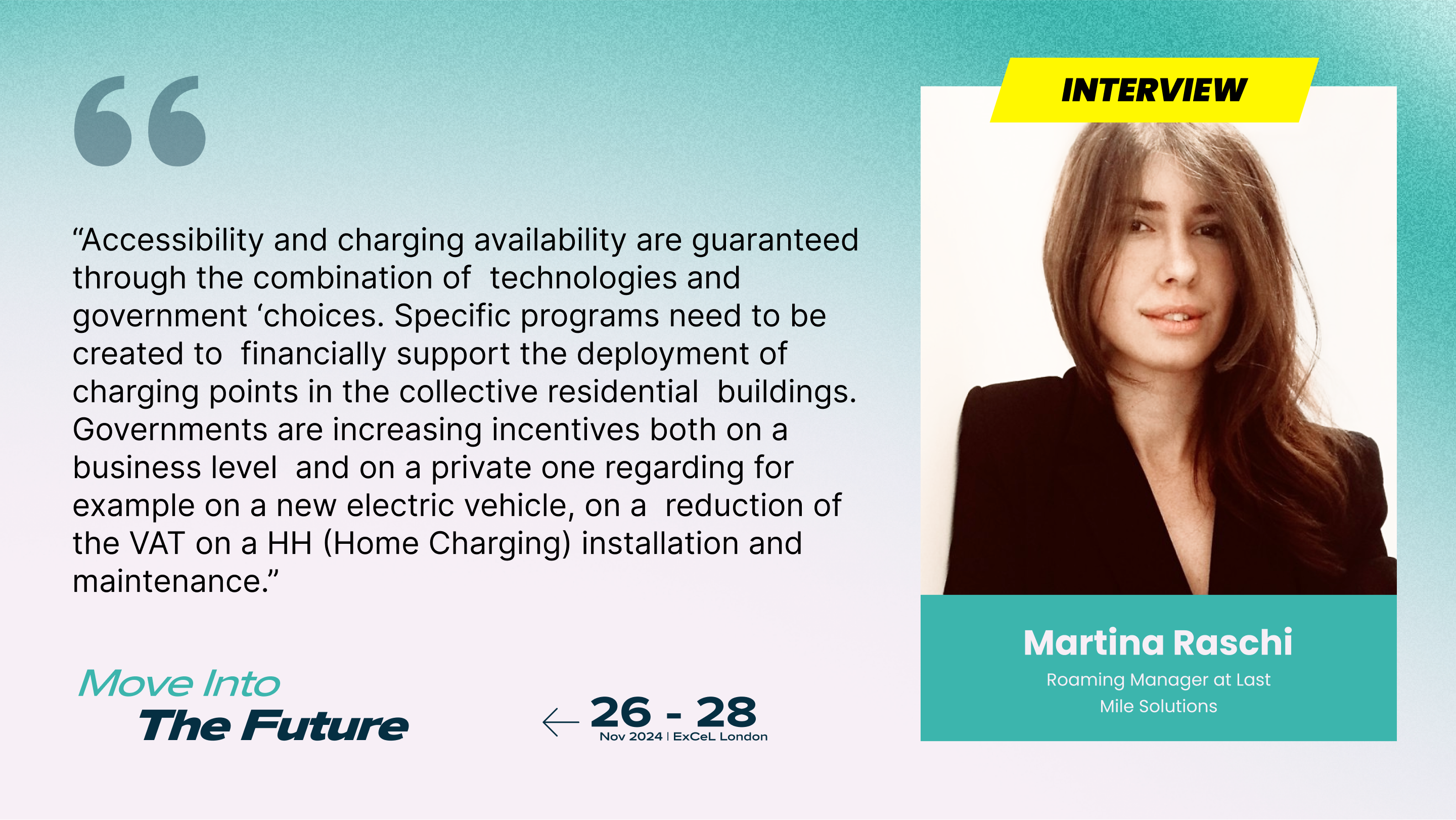We are delighted to present a Q&A session with Martina Raschi, the charismatic and energetic Roaming Manager at Last Mile Solutions. Martina's strong personality and determination have been instrumental in securing agreements and contracts with major players in the EV market. Her passion for e-mobility shines through as she leverages her networking, communication, and connection-building skills to drive the industry forward.
This engaging session, conducted by Imran Mushtaq, explores the impact of ultra-fast chargers on charging times and long-distance travel, advancements in European EV charging technology addressing grid integration, the role of smart energy management SaaS platforms, and the importance of accessibility and charging availability in rural areas. Martina also shares her thoughts on how events like the London EV Show accelerate the adoption of electric vehicles by uniting key stakeholders and showcasing the latest advancements in the field.
#LEVS: With the rise of Ultra-fast chargers in Europe, how is this advancement impacting charging times and long-distance travel feasibility for EVs?
#Martina Raschi: It is essential to evolve and transform the way we travel. Ultra-fast chargers are impacting positively the long-distance travel. In our world we are observing an increased number of electric vehicles together with a reduction of the charging time. This combination is possible thanks to the Ultra-fast chargers. However, challenges are always present, and solutions need to be adopted. 350 kWh in only 30 minutes as an average of charging time is the concert between vehicle manufacturers, energy suppliers and governments following new regulations. Innovation in batteries (dual chemistry battery), optimization of energy management systems, platforms that cooperate to enrich the network of fast charging stations are the foundations of the revolution of EV-market for long distance travel.
#LEVS: Beyond charging speed, are there advancements in European EV charging technology that address grid integration and potential strain on the power grid?
#Martina Raschi: Innovations and technologies are the pullers of progress. In the current scenario the integration of smart technologies in electric cars can optimize real time energy consumption and adjust performance according to the distance, traRic, and road terrain, even weather. Predictive behavior can improve the energy management system. V2G (Vehicle to Grid) allows electricity to flow back to the grid balancing the demand. V2H (Vehicle to Home) and V2L (Vehicle to Load) is the physical extension to our homes or loads. Together, the innovative lithium and acid batteries and wireless technologies are the promises to this current progress.
#LEVS: How are smart energy management SaaS platforms in Europe helping charge point operators and mobility service providers optimise energy use, reduce costs, and integrate with renewable energy sources?
#Martina Raschi: Smart Energy Saas Platforms like Last Mile Solutions are the answer to the question. Specifically, Last Mile Solutions is an independent EV charging and Smart energy management platform for charging point operators and e-mobility services that adapts companies needs. CPOs and eMSPs, to contribute to the development of the EV-market and make the end drivers satisfied with the new needs, require a large platform to operate, inhouse billing and settlement, a roaming in continuous expansion. Roaming with geographical coverage in all Europe can support the end user with only one subscription to be able to travel around without limits: extra miles. Platforms like Last Mile Solutions connected with other multiple roaming platforms is the goal to perform.
#LEVS: As Europe pushes for wider EV adoption, how are advancements in EV charging technology addressing concerns about accessibility and charging availability in rural areas?
#Martina Raschi: Accessibility and charging availability are guaranteed through the combination of technologies and government ‘choices. Specific programs need to be created to financially support the deployment of charging points in the collective residential buildings. Governments are increasing incentives both on a business level and on a private one regarding for example on a new electric vehicle, on a reduction of the VAT on a HH (Home Charging) installation and maintenance. These choices made by the administrations are the first actions to integrate the system into urbanization. New laws and regulations need to be adopted to ensure the promotion of the accessibility of the services and mainly in all the points of interests (locations). Acting in this direction we will guarantee the reduction of discrepancy between the city and the rural area.
#LEVS: How do events like the London EV Show contribute to accelerating the adoption of electric vehicles in Europe by bringing together key stakeholders and showcasing advancements in EV technology, charging infrastructure, and sustainable solutions?
#Martina Raschi: Events like the London EV Show contribute to accelerate the evolution and to implement the sense of awareness about e- mobility. During these business events the key stakeholders work together to evolve the market on a technical side and on a strategy level. Networking, connections, experiences focused on the topic support the system to be implemented with new ideas. Last but not least encourage companies to invest in the new e-mobility directions to support society.

